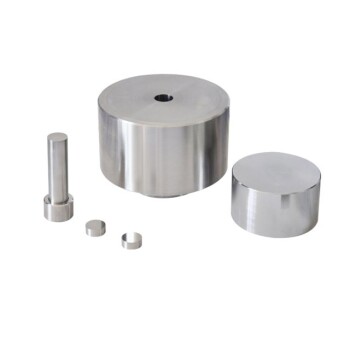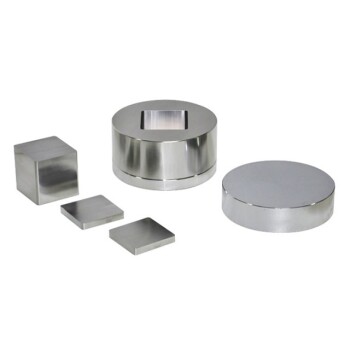In short, presses are fundamental tools used across manufacturing, research, and quality control. In manufacturing, they are used for forming, molding, and laminating materials like plastics, rubber, and composites. In research and laboratory settings, they are primarily used to prepare consistent material samples for analysis and to test the physical properties of substances under force.
The true role of a press extends beyond simple shaping. It is a tool of transformation and validation—transforming raw materials into finished products in manufacturing, and transforming powdered or bulk substances into analyzable samples in research.

The Role of Presses in Production
In a manufacturing context, the primary goal is to efficiently and repeatably shape materials into a desired form. Presses are the workhorses that make this possible through several key processes.
Forming and Molding
Presses apply force to shape materials, often in combination with a mold or die. This is the foundation of processes like compression molding, where a heated material is placed in a mold and pressed into shape.
Other common methods include transfer molding and over-molding, which are essential for creating complex plastic and rubber components used in everything from consumer electronics to automotive parts.
Laminating and Bonding
Beyond shaping a single material, presses are used to bond layers of different materials together. This process, known as laminating, uses pressure and often heat to create composite materials.
This is critical for producing items like plywood, laminated textiles, or advanced aerospace components made from layers of carbon-fiber-reinforced plastics.
Specialized and High-Precision Production
Certain industries require extreme precision. Specialized hydraulic and pneumatic presses can achieve sub-micron accuracy, a level of precision necessary for manufacturing delicate components like the lead frames used in microchips.
The Press as a Core Laboratory Instrument
In a laboratory, the focus shifts from mass production to precision, analysis, and discovery. A lab press is a versatile tool for sample preparation, material testing, and research and development (R&D).
Sample Preparation for Analysis
Many analytical techniques require a sample to be in a solid, uniform, and often transparent state. A laboratory press is essential for this task.
For example, in FTIR spectroscopy, a sample is mixed with potassium bromide (KBr) powder and pressed into a thin, transparent pellet. This ensures the infrared beam can pass through the sample consistently.
Similarly, presses are used to create sample pellets for X-ray fluorescence (XRF), a technique used to determine the elemental composition of a material.
Material Science and R&D
Presses are a cornerstone of materials science. Researchers use them to test the strength, durability, and failure points of new materials by subjecting them to controlled, high-pressure forces.
They also allow for the study of how substances behave under extreme pressure, providing fundamental insights into material properties that can fuel new product development.
Prototyping and Advanced Applications
The versatility of lab presses makes them ideal for R&D and prototyping. They are used to create prototypes of microfluidic devices and even to form cellular scaffolds for tissue engineering.
Because they can be fitted with custom dies and operate under a wide range of pressures and temperatures, they are perfect for testing new ideas on a small scale before committing to large-scale production.
Understanding the Key Distinction: Production vs. Lab Use
While both production and lab presses apply force, their design and purpose are fundamentally different. Understanding this distinction is key to appreciating their specific applications.
Focus on Throughput and Automation
Production presses are built for speed, repetition, and volume. They are often integrated into automated assembly lines and are designed to perform a single, specific task thousands of times a day with minimal variation. The primary metric is parts per hour.
Focus on Precision and Versatility
Laboratory presses are built for control and flexibility. An operator needs the ability to precisely manage pressure, temperature, and duration. Their value comes from their adaptability to different materials, sample sizes, and experimental goals.
The Overlap: Quality Control and Lean Manufacturing
The line between lab and production blurs in quality control (QC) and small-scale manufacturing. A lab press is often situated near a production line to pull samples and test them, ensuring the final product meets strength and performance standards.
They are also perfectly suited for short production runs, lean manufacturing, and cell manufacturing, where flexibility is more important than massive throughput.
Making the Right Choice for Your Goal
The application of a press is dictated entirely by your objective. Whether you are creating a product, analyzing a substance, or ensuring quality, the press is a foundational tool.
- If your primary focus is mass production: Your goal is to use presses for high-volume molding, forming, and laminating of materials into finished goods.
- If your primary focus is scientific research: Your goal is to use a laboratory press to create consistent, high-quality samples for analytical techniques or to test the physical limits of a material.
- If your primary focus is quality control: Your goal is to employ a press to verify that production materials meet required strength and composition specifications.
Ultimately, a press is a device that applies controlled force to achieve a specific outcome, making it one of the most versatile and essential tools in modern industry and science.
Summary Table:
| Application Area | Key Uses | Examples |
|---|---|---|
| Manufacturing | Forming, molding, laminating | Compression molding, composite materials, automotive parts |
| Research & Lab | Sample preparation, material testing | FTIR spectroscopy, XRF analysis, material strength testing |
| Quality Control | Testing and verification | Strength checks, composition analysis for production samples |
Ready to enhance your laboratory's capabilities with reliable press machines? KINTEK specializes in automatic lab presses, isostatic presses, and heated lab presses, designed to meet the precise needs of research and quality control labs. Our equipment ensures consistent sample preparation, accurate material testing, and improved efficiency. Contact us today to discuss how we can support your specific requirements and drive your projects forward!
Visual Guide

Related Products
- Laboratory Hydraulic Press 2T Lab Pellet Press for KBR FTIR
- Automatic Laboratory Hydraulic Press Lab Pellet Press Machine
- Manual Heated Hydraulic Lab Press with Integrated Hot Plates Hydraulic Press Machine
- Laboratory Hydraulic Press Lab Pellet Press Button Battery Press
- Manual Laboratory Hydraulic Press Lab Pellet Press
People Also Ask
- How do hydraulic press machines ensure precision and consistency in pressure application? Achieve Reliable Force Control for Your Lab
- Why must a laboratory hydraulic press be used for pelletizing samples for FTIR? Achieve Precision in Spectral Data
- Why is sample uniformity critical when using a laboratory hydraulic press for humic acid KBr pellets? Achieve FTIR Accuracy
- How is a laboratory hydraulic press used for polymer melt crystallization? Achieve Flawless Sample Standardization
- What role does a laboratory hydraulic press play in carbonate powder prep? Optimize Your Sample Analysis



















